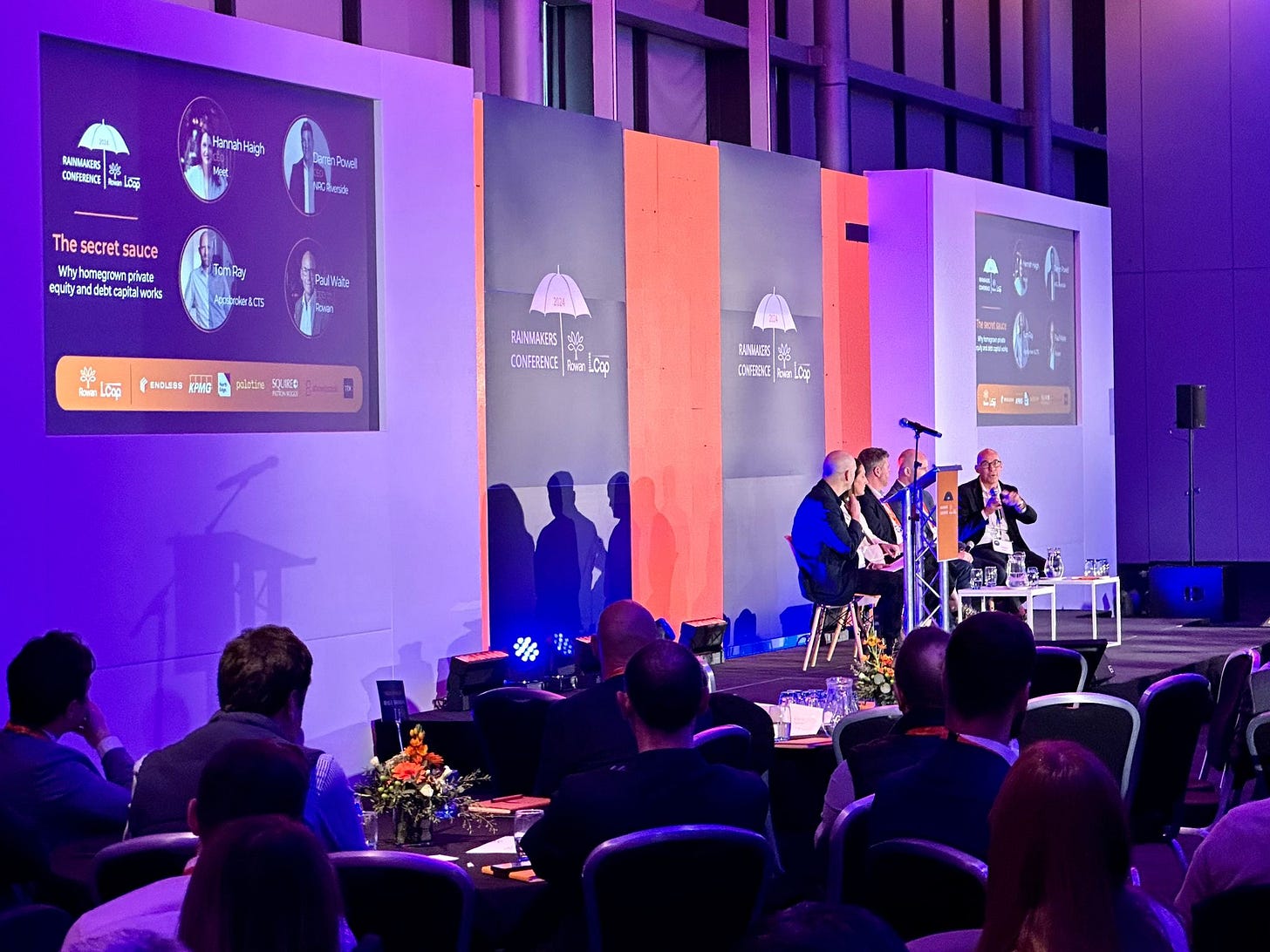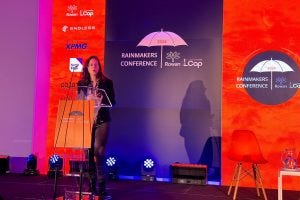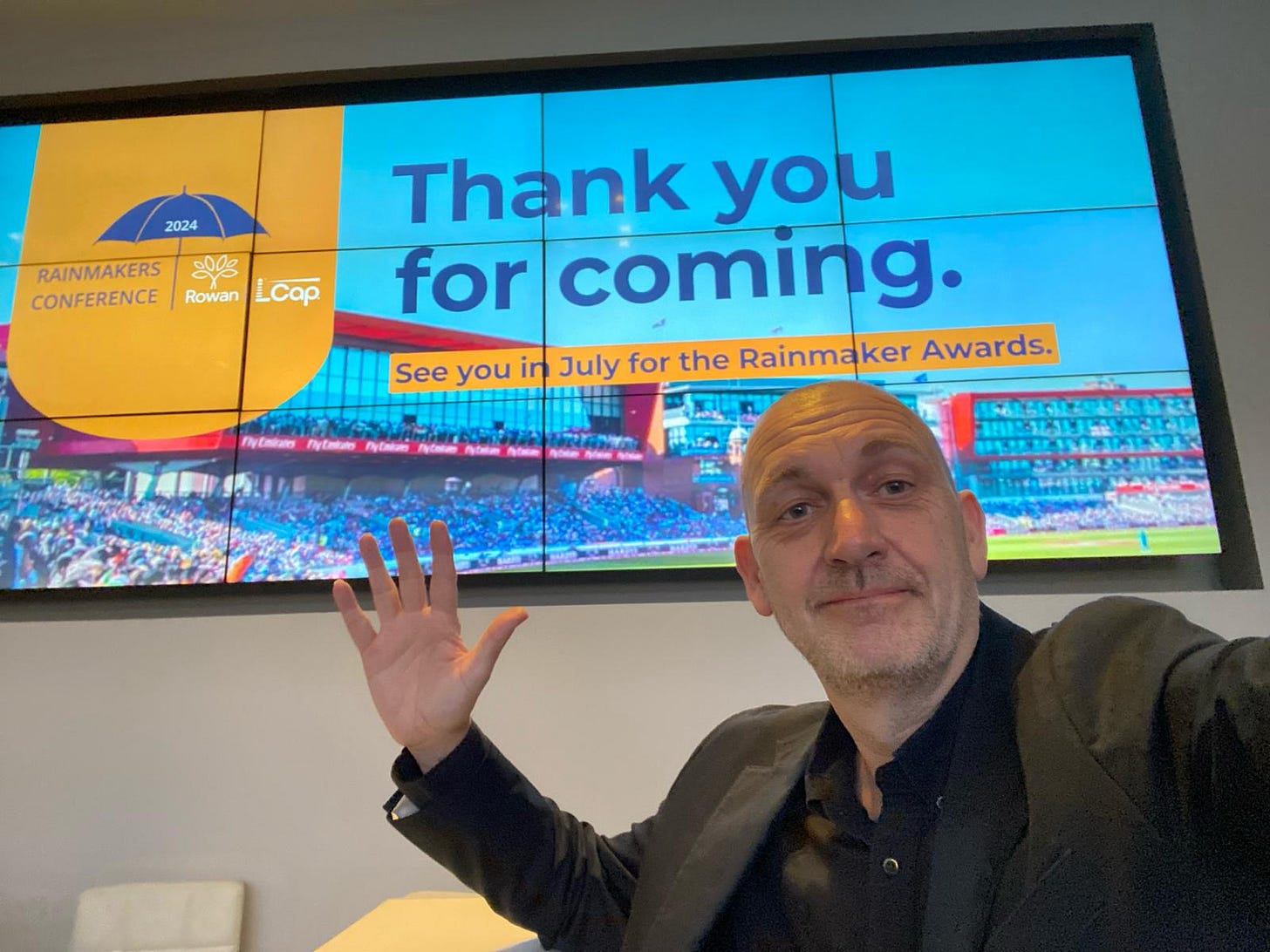Honesty, vulnerability, generosity and ambition in equal measure
The highlights of our first Rainmakers conference - a sell out event with a strong message
The first Rainmakers Conference, hosted by TheBusinessDesk.com, brought together 400 corporate finance professionals and business owners in Manchester.
Garry Wilson, chair of the British Venture Capital Association (BVCA) and managing partner of Endless, set the scene by emphasising the strength of the North’s corporate finance sector.
“Here in Manchester we have, by some measures, Europe's second largest gathering outside London for private equity firms. Leeds has also grown, from just three firms in 2005 to double digits.”
Wilson was upbeat about the potential.
He said: “There has never been a better time for entrepreneurs to get the backing they need. There has never been a better time for family firms to address succession issues with the introduction of new capital - our capital.
“There has never been a better time for management teams to get the backing and support that they need – and indeed there has never been a better time for successful business owners to reap the rewards.
“The even better news is that we remain a young industry with huge room for growth.”
Joe Manning, managing director of inward investment agency MIDAS, talked about the interest there is in the region, from Texas to India, with the North prominent in trade missions and free trade agreement.
He said: “A city-to-city, or city-to-state, dialogue can be the most effective, particularly when it's business, alongside universities, alongside our sporting and cultural institutions.
“There is an opportunity to further strengthen connections between the work that I do, the work the city region does, and the people in this room too. Then we can collectively tell our vibrant growth story around the world.”
TheBusinessDesk.com’s North West editor Michael Taylor, who hosted the conference, said: “We want this to be the start of a deeper partnership between theBusinessDesk.com and the corporate finance community. For too long one of the economic success stories of the last 20 years has been excluded from the conversation of how private capital and professional expertise can help shape the future economy of the North. Today we saw honesty, vulnerability, generosity and ambition in equal measure.”
Claire Lewis, founder of CEO of Baltic Ventures, said: "Fabulous to see such a packed room from the region's thriving private equity community."
Chris Stott, partner at KPMG, said: "Great to see the North West deals community out in full force supporting the inaugural Rainmakers Conference discussing all things M&A & deals at The Point, Old Trafford. Well done to the team for making this happen."
Mark Lyons, investment director at Puma Private Equity: "The event represented the largest gathering of the VC/PE community outside of London and despite the economic headwinds there was definitely a sense of optimism in the room."
Kai Ojo, chief executive of Planisware UK, said: "I'm buzzing, I spent the day at the Rainmakers Conference24 in Manchester as I decided to invest in myself and focus on learning, expanding and growing my mind - through listening to other people talk about what they do, share their insights and networking with likeminded people."
::
The Secret Sauce, why homegrown private equity and debt capital works
Private equity-backed businesses have made a major contribution to the drive and ambition of the Northern Powerhouse.
They have created jobs and driven further external investment.
A panel discussion at the Rainmakers Conference examined some of the successful investment that the region's leading PE houses have brought, along with their expertise and commitment to the North, as indigenous investment businesses themselves.
This session was chaired by Michael Taylor, TheBusinessDesk.com's North West editor, with the panel including Tom Ray, CEO of Appsbroker and CTS, Darren Powell, CEO of NRG Riverside, Paul Waite, CEO of Rowan and Hannah Haigh, CEO of Meet.
Explaining the secret to PE success and how this can be broadcast more widely across the region, Waite said: "It's about understanding the founder's goal, what they are trying to achieve and aligning that with the leadership team you're bringing in.
"In the northern region we have so many examples of PE success stories. There are many founders who can share success stories to dispel that fear of PE."
Haigh said that while she was aware of "horror stories" surrounding some people's PE investment journeys, she had personally spent a lot of time talking internally within her business to dispel the fear of PE.
"I had to show that taking PE investment would improve the business and create much more opportunity for everyone at the company," she said.
Commenting on her own firm's experience of working with private equity firm, NorthEdge, she said: "It's important to have a really clear and unified goal. You need to be clear about your long-term goals. And you should have constant communication and updating - an authentic relationship.
"We had to pivot over the last year to 18 months. Now the portion of the business that used to be our cash cow before the investment is the largest cash drain.
"We've had to stay confident that this is a short-term challenge. So a lot of this is about nerve holding."
Highlighting his own business's funding journey, Powell said: "We've had nothing but really good experiences with advisory firms here.
"A lot of people have been tightening their belts but with support from Palatine we could invest £13m a year in new stock.
"It could have been a different story if they didn't have that trust in our business plan."
And Ray added: "We're in a very high growth sector and last year we went to market looking for opportunities to grow the business.
"NorthEdge gave us the firepower to realise those ambitions. Having the right backers who understand the market is really important and there's some hard conversations to be had."
::
Making the region attractive to global institutions in toughest of fundraising markets
Even in the toughest of fundraising markets, Northern investment funds have attracted significant capital flows.
A panel at the Rainmakers Conference showcased how major regional players have raised significant sums despite macro headwinds, and explored what private equity and debt funds can do to make themselves even more attractive to global institutions.
The panel was chaired by Anna Cooper, assistant editor for the West Midlands at TheBusinessDesk.com and included Gary Davison, founding partner at TDC, James Mitchell, head of strategic partnerships at Phoenix Group, Keven Parker, joint managing partner at NorthEdge, Gary Tipper, managing partner at Palatine and Lucia Villamor, partner investor relations at Endless.
Panel members agreed with the importance of stressing their regional credentials when looking to attract further backing.
Davison said: "We do drive the northern angle when we say that we can get the best returns. We identify ourselves with our investors.
"As a business based in this region we're connected to our clients and connected to the market."
Tipper, who said the fundraising market was toughest he's known in thirty years, nevertheless said having a regional story was a strong selling point: "We're a purely regional player with decisions made outside London and we use this as a differentiator when we're fundraising.
"I believe most people want to work with regional fundraisers, people who talk the same language as them, maybe even support the same football team.
"But we still have to articulate exactly why people should invest with us instead of with someone in the South."
Villamor added: "For us our northern heritage is a really important part of our differentiation. It's something we always lead on.
"When we tell people we're based in Leeds and Manchester, there is initially some surprise, but when we explain to them our industrial heritage that is something they understand."
Parker said investment funds in the North can be complementary to their London-based counterparts.
"We're on the ground here, we're headquartered in Manchester, we can get to businesses earlier and can build long-term relationships with those companies," he said.
"There's less competition here than in London but plenty of very interesting companies to invest in."
Mitchell said it always makes good sense to invest across different parts of the country.
"Historically people have focused on the south of England but at Phoenix we try to be democratic about allocation of capital," he said.
"Our primary commitment to our customers is performance, but we continue to invest across the country where we see best value. We see the benefits of having diverse regional investments because that means less risk."
He also emphasised the key role of treating clients as partners, noting: "My team has to understand what it's like to sit on both sides of the table. You have to be able to work with your partners, so every time they have a good idea they ring you first."
::
Impacting investing - Rainmakers for good
Investors in funds are looking for opportunities to deploy their capital through investment professionals who have the appetite to tackle some of the biggest issues in society, such as education and job inequalities, access to healthcare and climate change.
The dynamics of making a positive societal impact through private equity investment are constantly changing.
At the Rainmakers Conference in Manchester, the Rainmakers for Good panel set out their priorities and thinking.
Paddy Dowdall, assistant director at the Greater Manchester Pension Fund, said: “Everyone who lives and works in Greater Manchester is a stakeholder in the fund. We're looking to provide long term returns for them.
“Many years ago, the council's board of trustees decided that they wanted to have investments with twin aims - to invest locally. They got a QC's opinion as to whether or not their fiduciary responsibility would be affected by this, and the opinion helpfully said it wouldn't, as long as it wasn't a detriment.
“Essentially, it's got to be commercial returns. The key point here is that we're not the lender of last resort, we want to invest to get a return.”
Lucie Mills, NorthEdge’s value creation and ESG partner, believes there are many positives to a twin approach.
“How we pitch what we do in an ESG perspective to our investors, but also to our portfolio: it is not mutually exclusive to strong returns,” she said.
“We fundamentally believe that if you do the right thing, for things that are material to your business, you will attract a broader range of people that are interested in that business. And ultimately, we will deliver better returns for our investors.
“We really see ESG - if you focus on it in the right way - as an enabler.”
Despite some signs of a step back in America, Palatine’s sustainability director Stephanie Wall is confident that there is still strong momentum on this side of the Atlantic.
She said: “What we have seen in the UK and in Europe is that investors are still really engaged, and more so than ever.
“We've had been doing ESG for 14 years - so, way before it was cool - but we've always been on the front foot with our investors and demonstrating the positive outcomes that we've achieved as a result of engaging our management teams on ESG.
“But there's a lot more that we're getting back now. I think there's a lot more sophistication, a lot more maturity within the LPs, and it's really nice to have that engagement back from our investors as well.”
Zara de Belder, associate director, transactions and sustainable finance at Anthesis, highlighted the breadth of due diligence that now takes place.
“We now do things like climate risk screening, human rights assessment, supply chain, workplace culture,” she said.
“That really helps actually establish a baseline and get a clearer sense around how management teams are thinking about ESG, what type of governance processes they've got in place.
“As the ESG landscape has evolved so much, it’s about being able to make sure teams have the right knowledge, the right skills, and the internal resource to help deliver on that strategy. It's really part and parcel of the whole sustainability transformation journey.”
Sharon Cooper, head of organisational culture and development at Inclusive Employers, added: We can put the plans in place, we can gather the data, we can do all the analysis. But I think it's about recognising that each organisation is individual, it has its own culture and its own way of working.
“It's making sure that the interventions that are in place are representative of that organisation.
“How do we stop it being box ticking? Leadership buy-in is essential to this, but it has to be communicated consistently and well.
“If things aren't going well, be authentic about that, and have those honest conversations and reset.”
::
Creating the next winning deals - views from the venture funders
Innovation and wealth creation in the North can go together.
The proliferation of venture capital should be a symbol of the ambition of a region’s economy, but what are the real prospects of supporting a successful unicorn that builds on the spirit of innovation in the North, alongside the obvious investment appetite?
This session of the Rainmakers Conference looked at the pipeline of ideas and exciting companies in technology, AI, material science and biotech which have world changing potential, and asked what barriers need to be removed to make them a success.
Taking part in a panel chaired by TheBusinessDesk.com's North West editor, Michael Taylor, were David Foreman, MD and founder at Praetura Ventures, Claire Lewis, co-founder and CEO at Baltic Ventures and Andrew Cope, chairman of Gilbanks.
Lewis highlighted the significance of having a proper ecosystem in place, which can serve as a "hive mind" to offer business founders the best advice and support.
She said such an ecosystem could stop "founders going down the same rabbit holes and making the same mistakes."
Lewis added that as a trained accountant she understood the importance of being realistic about money. But she also warned: "There are too many investors in the UK who have low expectations of founders and businesses. It takes founders with a lot of belief to power past that."
Cope said he wanted to see more efforts put into building companies which have the ability to sustain themselves far into the future, regardless of changes in personnel.
He said: "We lack ambition in this country. We need to think about how we can keep more people on that journey to create bigger and more sustainable businesses.
"Our culture is too much like 'rape and pillage' - we get to a certain point and we want to cash all the treasure in."
Foreman responded that it takes a long time to build a great company, adding: "I disagree that there's a lack of ambition.
"The problem is that people don't see enough of the success stories. We need to celebrate success stories more rather than rip them down, so they can give back to the next generation."
He also focused on the need for advice and mentorship, explaining how he had set up a programme to connect early stage business founders with people who had successfully navigated this journey and could share their experiences of what it takes to establish a successful company.
Foreman said the North is still lagging far behind London when it comes to Venture Capital backing, pointing out that currently 80% of this support is in the capital, compared to just 3% in northern England.
::
Interest rates to hit new norm of 3% says KPMG chief economist
Attendees at the Rainmakers Conference heard how Britain's battered economy is likely to fare over the next couple of years, in a presentation delivered by vice chair and chief economist at KPMG, Yael Selfin.
Selfin said that with inflation now generally under control, this is expected to reach the Bank of England's 2% target relatively early in this year, with interest rates predicted to be cut to, then remain, at a "new norm" of around 3%.
"We've seen an ease in vacancies in the labour market, making it easier for businesses to find staff," she said. "We are expecting unemployment to pick up a little, but not by much.
"Until recently there have been excess savings due to people not being able to travel during Covid but this is no longer the case.
"However, pay growth is starting to overtake inflation so people are gradually recovering their purchasing power.
"We need to increase our longer term growth in the UK. Before the 2008 recession we were used to seeing annual growth of two to two and a half per cent.
"In order to achieve that again we need to have stronger productivity and one of the ways to tackle that is through business investment."
::
Facing the future - diversity breeds resilience in business
A panel of business leaders at the Rainmakers Conference assessed the prospects for the year, including what businesses can do to support their long-term growth as they recover from the impact of the pandemic.
Following a very turbulent few years for companies, panellists discussed how firms can build up their resilience over the months ahead, while exploring issues around diversity in workplace culture.
The panel was chaired by Michael Taylor, TheBusinessDesk.com's editor for the North West, and included Erika Brodnock, CEO of Kinhub, Jen Murray, head of financial sponsors at Shawbrook Bank, Sophie Lawler, chief executive of Total Fitness and Samuel Roberts, chief strategy officer at The LCap Group.
Lawler detailed the torrid time her company had endured during the pandemic.
"Through Covid our sector was closed for the longest period and received the least support. We lost 25% of our base overnight and had to think very carefully about staying true to our core competency."
Murray said businesses have had to dig deep to survive and grow over the last few years, adding the shocks to the economy were still making themselves felt on the deal making landscape.
"If lenders are busy it's a good sign for the economy," she said. "This time last year it was a bit too quiet in terms of new deals but we are seeing activity picking up again, which is encouraging.
"However, everybody has learned to expect the unexpected and a lot of people are taking their time in choosing their partners. The whole deal process has slowed dramatically."
Roberts said it is challenging to build effective business leadership teams in such volatile times, adding that those teams which can attract diverse opinions will be more resilient.
But in focusing on gender diversity in leadership positions, he noted that while an average of 17% of executive board posts are occupied by women, this varies widely between companies. He warned many businesses still have no female representation at all on their boards.
Lawler said: "Diversity comes from having high levels of organisational trust. When you have that, people speak up and expand the debate. And when you expand the debate you have better decision making."
Brodnock added that she advocates for people to be authentic and to "be their whole selves" at work, which she said helps businesses thrive.
"It brings diversity of thought to the table and we're now seeing people who were previously overlooked in organisations now having their voices heard," she said.
"'Psychological safety' is what makes the difference - it's not just about hiring a woman because you have to be seen to hire a woman to be diverse.
"It's about creating an environment where everyone feels safe to enough to make their voice heard and understands that won't be used against them."
::
The incredible international expansion of San Carlo Restaurant Group
Addressing the Rainmakers Conference during his keynote fireside chat, Marcello Distefano, managing director of San Carlo Restaurant Group, outlined his group’s national and international growth since his father founded the enterprise in Birmingham in 1992.
He said: “We’ve had a great few years and are going through a lot of growth at the moment.
“We are a family business first and foremost, we’ve never been heavily leveraged and we’ve never wanted to be.
“We’ve got 25 sites in the UK and have got 10 franchises – that’s going to double in the next 18 months.
“We’re now looking at Ireland and mainland Europe, so we’ll have to think more strategically.”
He didn’t rule out an ambitious return to the home country with the opportunity to open in Milan, Italy. But higher on the list of key projects is a private members club in Hanoi, the capital city of Vietnam, where the group is developing a former French colonial house surrounded by rare trees.
He also welcomed the plethora of new globally known food brands looking at the city, and said it would raise everyone’s aspirations and standards.
“Manchester is really the capital of the North – there’s so much going on in this city. We’ve been in the city 20 years and are still seeing no signs of decline for our restaurant here.
“As retailers leave, empty spaces can only be filled up with food and beverage but we’re not worried anymore about the competition, because it’s just bringing more and more people into the city.”
::
Thank you for subscribing to Rainmakers.
We believe in good journalism that is worthy of your support. Please share this edition of Rainmakers so we can grow the message further and wider.
The insights and commentary we share with you are rooted in the trust we have built in the business community.
If you have something you think we should look at, then either reply to this newsletter or email michael.taylor@thebusinessdesk.com.











